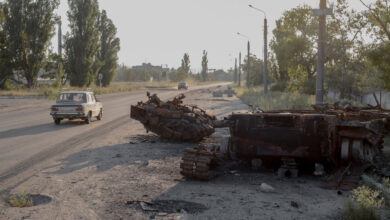HIV is a ‘serious health concern’ for drug users in Thailand

Thai authorities are working together with United Nations agencies to not only improve the availability of services following a change in the way drug offenders are convicted, but also reduce stigma against drug users and ensure they have access to services in which they feel comfortable.
UN News talk to UNAIDS Country Director, Patchara Benjarattanaporn, and Karen Peters, Regional Drug and Health Program Officer of the United Nations Office on Drugs and Crime (UNODC), about access to care for people who use drugs.

UNAIDS Country Director for Thailand, Patchara Benjarattanaporn.
Patchara Benjarattanaporn: The number of new HIV infections in Thailand is decreasing compared to 2010. However, this reduction is not nearly enough to achieve the goal of ending AIDS by 2030, which is a commitment made by all countries under Sustainable Development Goal number three, SDG 3. Therefore, HIV remains an important health concern.
There are about 57,000 people in Thailand who inject drugs. According to our most recent survey in 2020, 7.8% of those people have HIV. Another infection that is very common among people who inject drugs is hepatitis C, which affects the liver. About 42 percent have been infected, which is extremely concerning UNAIDS.

Karen Peters, UNODC.
Karen Peters: In UNODC, one of our focus areas is reducing the health and social consequences associated with drug use through supporting harm reduction interventions. People who inject drugs are at higher risk of HIV infection due to needle sharing and other risk behaviors, such as sex without a condom.
Patchara BenjarattanapornResearch shows that people who inject drugs are 35 times more likely to get HIV than people who don’t inject. The high prevalence rates due to these risky behaviors, however, are other important structural barriers to access to treatments. The extremely punitive legal framework that exists, as well as stigma and discrimination, are important factors that prevent people from accessing services and care.
Karen Peters: UNODC has been supporting national harm reduction activities by convening a wide range of stakeholders, governments, civil society organizations and UN agencies to discuss plans to implement harm reduction measures under the auspices of the new law. For example, the Ozone Foundation, headquartered in the Thai capital Bangkok, is a community-based, peer-led organization whose primary aim is to reduce the harm caused by drugs. It was founded and operated by experienced drug users who provide advice and services in a non-judgmental, non-discriminatory environment. Customers coming to Ozone appreciate being consulted by like-minded people.

A health worker at the Ozone Foundation in Bangkok, Thailand prepares to be tested for hepatitis C.
Patchara Benjarattanaporn: Places like Ozone help reduce the stigma faced by drug users and encourage them to seek treatment. A significant transformation of the Thai health system also played an important role. Universal health coverage (UHC) was introduced in Thailand in 2002 and paved the way for comprehensive care, including essential services such as HIV testing, pre-exposure prophylaxis or PrEP, referral, screening and treatment for sexually transmitted infections (STIs) and hepatitis C.
There’s still a lot of work to be done; a relatively low percentage of people who inject drugs are enrolled in antiretroviral therapy, or ART, used to treat HIV. In the general population, about 90% of people living with HIV are on antiretroviral therapy, but this proportion among people who inject drugs is less than 50%.
Karen Peters: A new drug law enacted in December 2021 has also turned the narrative in a positive direction about people using drugs. Historically, Thailand has had laws that are very punishing for drug crimes. The new law provides for different penalties for drug offenses and alternatives to prison for some crimes. For the first time, it seems that the health and well-being of drug users is under review.
Patchara Benjarattanaporn: We are working on HIV prevention in many UN agencies in Thailand, especially UNAIDS, UNODC, United Nations Development Program (UNDP) and the World Health Organization (WHO). We are focusing on these key groups, these latent populations, by promoting community-led services that must be made available to those who need them in a situation where customers do not feel discriminated against. Combining testing for hepatitis C and HIV as part of a UHC treatment package will encourage more people to get tested. This integrated approach can also include harm reduction services.

The Ozone Foundation offers a range of harm reduction measures to prevent the spread of HIV.
Karen Peters: We are discussing strategies and frameworks for implementing community-based treatment. The Ministry of Public Health, the Office of Drug Control, various civil society organisations, international donors and technical experts all sat around the table to advise and suggest ways this could be moved forward in a more sustainable way for better outcomes for the people of Thailand.
Patchara Benjarattanaporn: We are also focusing on supporting the Thai government in a national strategy to support these vulnerable groups, using the most cutting-edge research and evidence-based solutions to create a high-impact intervention. A multidisciplinary approach and community involvement are critical to problem solving.
When governments show a commitment to face challenges, good things happen in terms of creating both equal access to services and their integration, and even more so, when civil society and partners like the UN have a say at the table. In this respect, Thailand can be seen as a model for the region.

SDG 3




